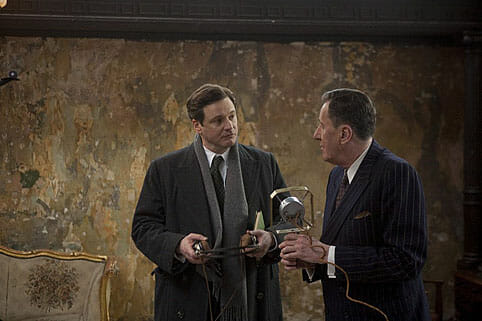By Ria Tesia · February 22, 2011

Very few films surprise me. Apart from the Twilight saga, which has been eye-gougingly painful to watch, I generally exit the cinema theater in a cloud of smug indifference. As I settled down to watch The King’s Speech, I anticipated an enjoyable period drama, which has left even the most cynical critics agog with praise.
Now, the thing about any hyped-up product is that the sky-high bar is already solidified by rave reviews, leaving little room for dissatisfaction. Thankfully, The King’s Speech did not disappoint. It merely surprised me. The romantic curveball that flew towards me caught me unawares – but more on that later.
The film centres around Colin Firth’s King George VI (aka Bertie), who suffers a debilitating stutter in an unsympathetic royal establishment. With Britain on the brink of war, the film charts the stammering monarch’s journey as he overcomes his affliction after his reluctant accession to the throne. We’re immediately thrust in the midst of the action as we see Firth’s royal protagonist struggle to address his problem and the public. The opening scene in which he battles with his stammer is breathtakingly poignant, with Firth’s pure torture being accentuated by the unconcealed disappointment of the crowd. Firth’s frustration at his stammer constitutes uncomfortable yet fascinating viewing, made all the more riveting with the era in which the film is set.
It’s the 1930’s, and a speech impediment is viewed as an insignificant yet peculiar problem, a fact beautifully portrayed by Michael Gambon. His dismissive patriarchal King George V is terrifyingly terrific as the overbearing father who cannot comprehend the extent of his son’s problem. Thankfully, our Bertie has staunch spousal support in the form of Helena Bonham-Carter’s Queen Elizabeth. In a society where avant-garde methods are frowned upon, Bonham-Carter manages to procure the services of Lionel Logue, speech therapist extraordinaire (Geoffrey Rush). Hence the commencement of an undeniably wonderful bromantic love affair.
The chemistry between the two male leads is one of the highlights of the film. Romeo and Juliet’s love affair pales into comparison to Firth and Rush’s delightfully passionate (albeit platonic) relationship. As the male leads share a frisson (or two), an over-looked third wheel Bonham-Carter fiddles nervously with her pristine gloves in the corner. As Firth and Rush spar, argue, separate and eventually patch things up like any couple (yes I willed them to kiss and make up), this gives the film an added dimension to render Firth’s journey as all the more emotional.
The film is rich in drama, has a tight script and beautifully nuanced humor that brought a communal smile to the theater’s face. One of my favorite scenes saw a perplexed Jennifer Ehle (Mrs. Logue) discover that her husband’s client was the monarch himself (Logue’s secrecy, in my opinion, only bolstered the romantic element of the script).
This being a biographical account loosely based on actual characters, the director is unable to deviate from an ending, which has already been recorded by history. We don’t have to wonder if the unlikely royal hero will be able to get through a full speech without a hiccup (no pun intended). We know what ultimately happens in the end, yet that doesn’t detract from the film’s entertainment factor.
The director (Tim Hooper) had a dream cast comprising of the crème de la crème of British talent. Firth played the afflicted monarch with poignancy, whilst Timothy Spall gave a highly memorable performance as the formidable Churchill. I am, however, dismayed by the lack of screen-time Spall had. The few minutes he was on was pure on-screen gold as he nailed the sagacious Churchill to a pitch so perfect that he left me craving for more. Helena Bonham-Carter was quietly brilliant whilst Jennifer Ehle (Firth’s co-star in a former life in the much lauded Pride & Prejudice) gave a solid performance too. Guy Pearce’s dissipated Edward VIII was wickedly endearing as he played the besotted lovelorn sibling with great aplomb, with a flawless clipped accent to boot.
Alexandre Desplat’s splendid score deserves a special mention; it was ethereal and when called for, spry, and positively ambrosial. After the recent success at BAFTA (clinching seven awards), Tim Hooper’s regal vehicle will undoubtedly speed away with at least half a dozen Oscars. A sequel would be great – now Mr Hooper, there’s food for thought…